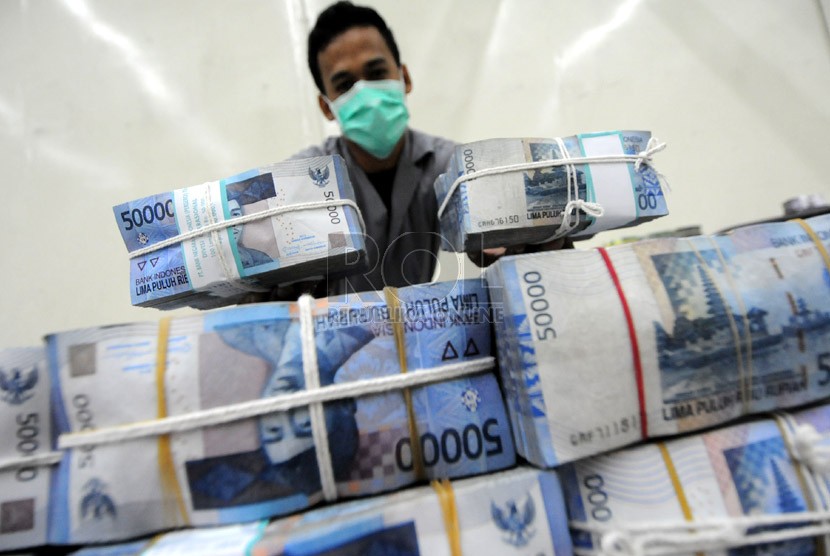REPUBLIKA.CO.ID, JAKARTA -- The public has been called upon to remain calm following downward fluctuations of the rupiah, which has been depreciating against the US dollar, falling from Rp11,335 earlier this month to Rp12,017 on Friday morning.
"We must remain calm and continue our activities as before. The rupiah's depreciation to 12 thousand against the US dollar is mainly due to global conditions," Bank Indonesia (central bank) governor Agus Martowardojo said here on Friday.
The rupiah weakened by 133 points to Rp12,017 on Thursday evening from the previous day's position. It weakened further to Rp12,018 on Friday morning, though it strengthened again to Rp11,965 in the evening.
Finance Minister Chatib Basri said the rupiah's value against the Greenback was improved at the closing on Friday evening at Rp11,965 against the US dollar.
"The development of the rupiah today is relatively good, but we must remain on alert," the minister said Friday night.
He noted that the rupiah has continued to depreciate in the past few days, but the government and the central bank, Bank Indonesia (BI), increased coordination in the face of developments in the rupiah.
BI's governor Agus Martowardojo has urged economic participants in the country not to panic over the depreciation of the rupiah to 12 thousand against the US dollar.
He said global unease, especially uncertainty with regard to the Federal Reserve's planned reduction of its monetary stimulus, is contributing to pressure on the exchange value of the rupiah.
"The US Federal Reserve is deciding whether or not it should taper its monetary stimulus. There have been good and bad economic indicators and investors are still uncertain about what will happen. That is affecting the value of the rupiah," he added.
The governor noted that, in general, economic conditions in industrial nations are likely to improve. The crisis situation in Europe will also ease, he predicted. "In Europe, consumer confidence has begun to improve," he added.
In developing countries, however, pressures on growth are expected to continue, Agus said. "In Indonesia, the pressure on the exchange rate is because demand for the dollar is high. Several investors opt to change their investment positions at the end of the month. So, we believe that this is a temporary phenomenon," he pointed out.
According to Ariston Tjendra, chief researcher at Monex Investindo Futures, the Indonesian currency came under pressure and even fell to a record low as money market participants grew concerned about the country's current account deficit.
"Sentiment toward the rupiah has not improved. Worries about the current account deficit are still high. Imports may slow down. However, exports are expected to increase enough to boost market confidence in the economy," he added.
The dollar continued to appreciate against the rupiah following reports that the US Federal Reserve would reduce its monetary stimulus soon.
Market analyst of Bank Himpunan Saudara Ruly Nova said the rupiah exchange value on Friday evening returned to a positive area after strengthening to Rp11,965, even though it was overshadowed by the country's current account deficit.
The Rupiah at the interbank transaction on Friday evening increased by 62 points to Rp11,965 from Rp12,027.
"However, the strengthening of the rupiah was limited by being overshadowed by the current account deficit sentiment," Ruly Nova said.
Also, corporate demand for the dollar currency to finance their activities inclined to increase in the run-up to the year-end, causing the rupiah to not significantly strengthen.
For Indonesia has risks of capital outflow amid The Federal Reserve's plan to taper its financial stimulus. "Basically, the rupiah currency will still continue to fluctuate pending the issuance of the Indonesian economic data and the realization of the tapering of the financial stimulus by the Federal Reserve," he said.
Finance Minister Chatib Basri concurred with Nova, saying there were two reasons for the rupiah's depreciation, namely concerns in the face of The Fed's tapering off plan and the increase in demand for US dollars in the run-up to the end of the year.
He explained that the tapering of the monetary stimulus by The Fed was an external factor which caused the rupiah and other currencies in the Asian countries to weaken. "Yesterday, not only the rupiah, but also other currencies, such as the Peso in the Philippines and the Baht of Thailand, also fell," the minister said.
The increasing demand for foreign exchange was an external factor that caused the fall of the rupiah. The demand was high because companies had high debts from interest rates to pay at the end of the year.
"In the run-up to the end of the year, companies have to pay their interest rates and possible imports, so that as per November they have to pay an amount of US$6.3 billion," Chatib said.
The minister said that one of the ways that could be used to face the volatility of the rupiah was to offset the current account deficit.
Therefore, he said, the government's economic policy packages, issued last August, and the ones to be issued in December 2013, would become important polices in responding to the deprecation of the rupiah.
"It is important to implement the economic policy packages, and we are happy the polices have gained good progress. Next week, the government will issue a policy with regard to imports and increasing exports," said the finance minister.
In the meantime, President Susilo Bambang Yudhoyono continues to monitor developments in the rupiah's depreciation and its impact on regional activities.
"The President continues to monitor fluctuations of the rupiah currency and regional economic activities. He also asked ministers to focus on making the structural reforms a success, especially structural reforms on matters that are related to the rupiah exchange rate, stimulus to the business world and the people's purchasing power," Presidential Special Staff on Economic and Development Affairs Firmanzah said.
The government, he noted, will continue to coordinate with the monetary authority, financial industry supervising agency, deposit guarantee agency and Bank Indonesia. (Andi Abdussalam)


